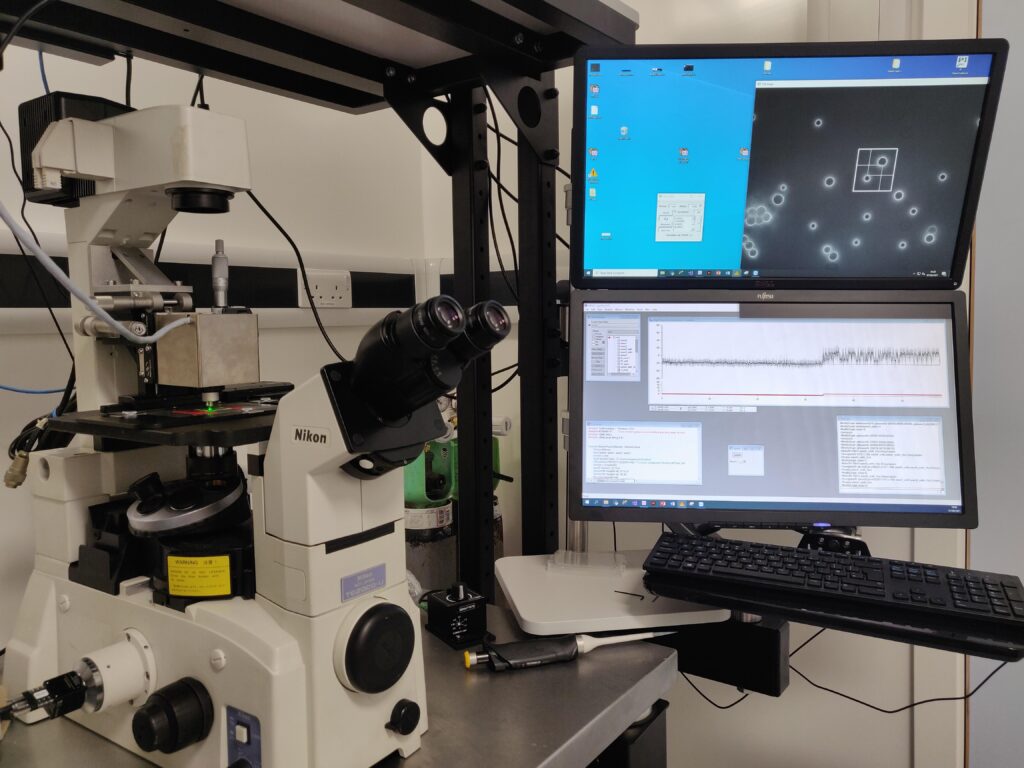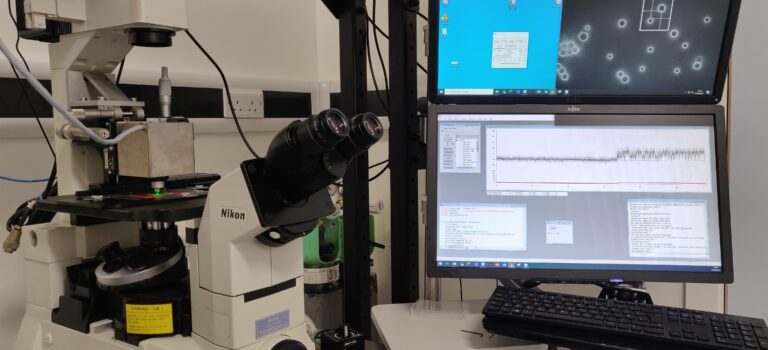In order to understand and control how cells transmit and detect mechanical forces, it is important to take a look at every scale: from the nanometre level all the way up to entire organisms. The Mechano·Control project brings together an interdisciplinary research community with expertise in different scientific fields and scales. With this interview, we will take a closer look at the nanometre level, which is the level of molecules.
Cells stick to their surrounding extracellular matrix and to other cells using integrins and cadherins. Forces applied to these molecular links change their properties, determining how cells behave, and sometimes activating the expression of genes. Let’s travel to London together with Marc Mora, a Postdoc in Sergi Garcia-Manyes’ lab at King’s College London, and dive into the nano world.
The role of the Garcia-Manyes lab in London is to provide their expertise on single molecule techniques. More specifically, they aim to decipher how mechanical properties of proteins impact cellular processes, such as the molecular mechanisms of adhesion or the passage of proteins through the Nuclear Pore Complex (NPC). The NPC is a large complex of proteins, that spans the nuclear envelope, a double membrane that surrounds the nucleus in eukaryotic cells.
In the last couple of years, Marc Mora has been studying the nuclear translocation process of proteins through the NPC, which is a recently uncovered step in nuclear mechanotransduction. More specifically, Marc is investigating the interplay between two intrinsic properties of proteins, their mechanical stability and protein mass, to understand and predict the rate of nuclear shuttling of proteins, and in particular, of key mechanosensitive transcription factors such as the oncogenic YAP and MRTF-A, known for playing a key role in cancer progression. But how do researchers work in the lab at this very tiny scale?
Concretely, Marc performs cellular experiments where he in cancer cell lines (such as U2OS and MDA-MB-231) with previously characterised mechanical properties, which they independently measure during in vitro experiments with single molecule techniques. These protein cargoes with varying mechanical stabilities are manipulated in and out of the nucleus using optogenetic methods involving blue light illumination. In parallel to these experiments, Marc also uses single molecule magnetic tweezers to study the conformational dynamics under low physiological forces of key protein mechanosensors, such as talin, that play a fundamental role in determining the adhesion of several cancer cell lines.

With all these experiments, Marc and the team at KCL aim to uncover whether the mechanical properties of individual proteins have a direct, knock-on effect at the cellular level.
“We believe we will be able to build a comprehensive model that integrates protein mass, protein sequence and mechanical stability to understand the dynamics of proteins, such as mechanosensensitive transcription factors, as they shuttle to and away from the nucleus.”
Marc Mora, KCL
And this is crucial for the Mechano·Control ultimate goal. If the researchers manage to further understand the impact of protein mechanics on cellular behaviour, they will be able to target specific adhesive interactions at the cellular level and determine new steps in controlling the nuclear mechanotransduction of key oncogenic transcription factors, with the final future goal of abrogating breast tumour progression. By understanding these processes with sub-molecular detail, we will use the control of protein elasticity as new therapeutic tools to fight breast cancer treatment.
“I feel very lucky to have the opportunity to be part of this European Project where scientists form different fields come together to work towards a common goal. It is very important for my academic development to have the opportunity of being part of such project, aiming to create such impact on people’s lives” adds Marc Mora. As we mentioned before, the Mechano·Control project covers a wide variety of scientific disciplines at very different scales, and as Marc says “This provides the grounds to put our single molecule work into a much broader context. This is an eye-opening experience in many different levels.”




